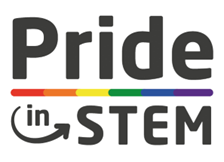Pride in STEM 2022: scientists to celebrate
03 November 2022
Amy Brewer, OCR GCSE Science and Applied Science Subject Advisor

November 18 is Pride in STEM day, celebrating the work of LGBTQIA+ scientists and highlighting the struggles of the LGBT STEM community. In this blog I’ll introduce you to four more scientists to celebrate in your lessons.

The need for representation
As a child with a passion for science and growing up in Brent, London with no tradition of higher education in my family, I had generous teachers and parents who enabled me to explore that passion. I remember the librarian telling my mother that books on astronomy couldn’t be found in the children’s section, but that didn’t stop us. Our headmistress would tell us that nothing was impossible, to aim for the stars. It never occurred to me that I couldn’t study for a degree in science because I was always surrounded by such strong women where barriers were inconsequential.
However, as we approach Pride in STEM day I’m reminded of how lucky I actually was. I had a few female scientists to look up to, who I knew had broken the mould, and I wanted to be like them. I was going to fight cancer, cure diseases, help to improve the world. And while my career has taken me on a different path through education, I still think it’s important for all young people to see the opportunities available to them in a STEM career.
So, following on from my blog earlier this year, I’ve put together another set of profiles of out scientists for you to use with your students. I’ve also included links to resources that you can use in your science lessons, and for displays in your classrooms.
The great Billie Jean King once said “you have to see it to be it” and hopefully you will be able to use these resources to enable all of your students to pursue a career in STEM and promote inclusivity.
LGBTQIA+ scientists to celebrate
Dr Linda Cremonesi is an experimental particle physicist at Queen Mary University of London. She is a neutrino hunter, with her work taking her to Japan, USA and Antarctica. She has spoken in schools and public events about her work and her experience as an LGBT female scientist. Introduce Dr Cremonesi’s work and explore the subatomic world with Particle Zoo.
Dr Matthew Leech is an organometallic chemist, currently working at the University of Greenwich. He is using organic electrosynthesis to make pharmaceutically important compounds. As one of Pride in STEM’s Out Thinkers, he has also been interviewed on podcasts about the changing chemistry community in the UK. His work using electricity as a mild and green source of electrons in the synthesis of organic compounds also links nicely with the sustainability theme for Chemistry Week this year.
Dr Scott Allan Orr is an engineer who uses data to help protect and preserve buildings of cultural importance. By looking at the impact of historic environment and climate change, he has informed national and international agendas on heritage and is a great example of the importance of Data Science to inform how we build in the future. So much of what scientists do is ‘dry lab’ work and involves a good understanding and skill with spreadsheets and data processing. Try using this Bioinformatics resource from The Science Teacher with KS3 and 4 classes.
Helen Potts is a second-year postgraduate student at the University of Oxford. She is looking at the amazing healing abilities of the Astyanax Mexicanus fish, some which are able to regenerate their hearts following cardiac injuries. Helen is hoping to learn more about how their immune systems repair organs so we might be able to understand how to improve human treatments in the future. This NHS resource to test your heart age could be used in class with students changing different lifestyle variables to explore the impact on heart health.
More resources
Stay connected
If you have any questions, you can email us at science@ocr.org.uk, call us on 01223 553998 or tweet us @OCR_Science. You can also sign up to subject updates and receive email information about our science resources and support.
About the author
Amy joined OCR in May 2022 and is a subject advisor for GCSE Sciences and Applied Science. Before joining OCR, Amy taught Chemistry to 11-18 year olds for 16 years, and was responsible for planning her school’s science schemes of learning. In addition to her teaching responsibilities, Amy mentored PGCE students, was responsible for the progress of KS5 science students, and is committed to improving diversity and inclusion in the sciences.
Related blogs